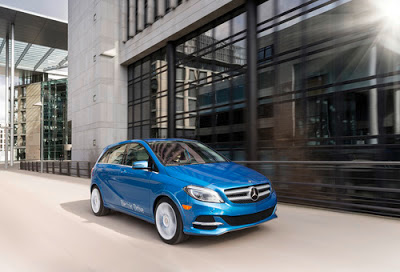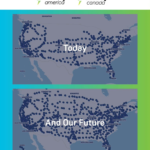Daimler just announced they’re looking to end the powertrain supply deal with Tesla Motors where the Mercedes-Benz B-Class Electric has Tesla drivetrain goodness under the hood. The purpose is to bring battery pack development in-house, and to prepare for selling a B-Class Electric with a 500 kilometer range (300 miles). That means Daimler is looking to join Audi in competing against Tesla Motors for the electric luxury SUV market. But – both companies will be 3+ years behind Tesla, whose 500 km range electric SUV is due to go on sale in October, and neither company has a good story around charging infrastructure to support road trips.
Earlier this week Audi revealed teaser images of the Audi e-tron quattro electric SUV concept car due to be unveiled in September at the Frankfurt International Motor Show. That car will feature a 500+ kilometer range, seat four people (WTF), and Audi told us it was a preview of a vehicle Audi will produce beginning in 2018.
The Mercedes-Benz B-Class Electric Drive is the result of a partnership between Tesla Motors and Daimler. Daimler bought a chunk of Tesla’s stock several years ago and then worked with Tesla on designing powertrain components for a few vehicles including the B-Class car. That car went on sale in late 2014. So far in 2015 there’s been about 1300 sold in the US, while Tesla sold about 10x that amount, or 13,200 Model S’s in the US so far in 2015.
Last year Daimler and Toyota both sold off their stakes in Tesla Motors. Since then it’s become excruciatingly clear that Toyota wants to downplay battery electric cars in favor of fuel cell electric vehicles, and now Daimler is looking to go into competition with Tesla Motors on battery electric luxury SUV’s.
I came across the news of the split between Daimler and Tesla while writing some analysis of Tesla’s financial condition. As Tesla is preparing to launch sales of the Model X and Tesla Energy products, they’re rapidly burning cash, and to keep the company afloat have done another round of selling stock to raise cash.
The news of Daimler ending its deal with Tesla came through auto-motor-und-sport.de![]() who reported that Daimler wants to develop their own drivetrain components, while increasing the range of the B-Class Electric to 500 kilometers.
who reported that Daimler wants to develop their own drivetrain components, while increasing the range of the B-Class Electric to 500 kilometers.
This strikes me as an example of fighting yesterday’s battle.
So far in Tesla’s corporate existence, they’ve sold expensive ($100,000 or so) electric cars. The Model S is established with a significantly sized chunk of the luxury car market. Other luxury car makers like Daimler and Audi should certainly wake up and smell the coffee, right? And that’s what they’re doing, starting to take Tesla Motors as a serious threat. BMW woke up to this several years ago, and is selling the BMW i3 at a decent rate.
But is Tesla Motors staying in the luxury car market? Nope. Their plan all along had been to do as they’re about to do, which is to plow profits from luxury car sales into entering the mass market car market.
In terms of Achieving the Mission of transforming the transportation vehicle market, Tesla Motors would make very little impact solely with luxury cars. Those cars are a tiny percentage of the overall market. The Tesla Model 3 will be their first foray into affordable electric cars.
By the time Daimler and Audi have luxury electric cars to fight Tesla’s luxury car market share growth, Tesla will have an even stronger position in the luxury car market, and may have established a firm position in the affordable electric car market. And, of course, there’s the issue I mentioned earlier – none of the other automakers are approaching this problem the way Tesla is doing it. Where Tesla is rolling out a complete ecosystem of cars and charging infrastructure, the other automakers are simply making cars and leaving other parts of the business to 3rd parties.
While it may look like Tesla Motors is facing serious trouble – big corporations are taking aim – Tesla has a much stronger offering, and has a several year head start.
- Is there enough Grid Capacity for Hydrogen Fuel Cell or Battery Electric cars? - April 23, 2023
- Is Tesla finagling to grab federal NEVI dollars for Supercharger network? - November 15, 2022
- Tesla announces the North American Charging Standard charging connector - November 11, 2022
- Lightning Motorcycles adopts Silicon battery, 5 minute charge time gives 135 miles range - November 9, 2022
- Tesla Autopilot under US Dept of Transportation scrutiny - June 13, 2022
- Spectacular CNG bus fire misrepresented as EV bus fire - April 21, 2022
- Moldova, Ukraine, Georgia, Russia, and the European Energy Crisis - December 21, 2021
- Li-Bridge leading the USA across lithium battery chasm - October 29, 2021
- USA increasing domestic lithium battery research and manufacturing - October 28, 2021
- Electrify America building USA/Canada-wide EV charging network - October 27, 2021












